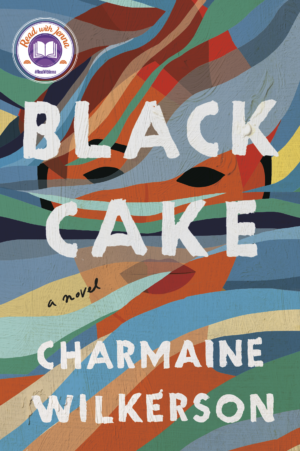Black Cake
by Charmaine Wilkerson
reviewed by Liberty Martin
Last Christmas, I helped my grandmother make black cake for the first time. This was serious business, an operation that covered my grandma’s living room and kitchen with vat-sized mixing bowls and various ingredients in order to make cakes for family and church members. Charmaine Wilkerson conjures similar scenes in her debut novel Black Cake, in which a deceased Caribbean woman named Eleanor Bennett leaves a black cake and a lengthy audio recording filled with secrets for her adult children, Byron and Benny.
Byron is a successful oceanologist in California who wants to be the perfect immigrant son, a “shining example of the American dream.” His younger sister, Benny, is a wayward queer artist living in New York City who feels estranged from her family. The siblings have not spoken in eight years, and the recording that their mother leaves them challenges everything that they knew about Eleanor and how she raised them. “We had to be perfect to make up for the fact that our family is built on a colossal lie,” Benny laments.
Black Cake is told from multiple perspectives, darting between Eleanor’s younger years in the sixties, Byron and Benny’s upbringing, and the siblings’ lives in the present day. Eleanor’s life story emerges as the most compelling, an illustrious saga that features gamblers, Olympian swimmers, a murder mystery, betrayal, heartbreak, and love. Even when these events become far-fetched, Wilkerson’s dynamic writing and choppy chapters will keep more cynical readers turning the pages to find out what happens next. With Eleanor telling her life’s tale in her own words, the author subverts the assumption that the children of immigrants are the best narrators of their family’s stories. Benny and Byron begin to empathize with Eleanor outside of their mother–child relationship, realizing that she “had given up parts of herself until most of who she had been was gone.” Wilkerson tenderly depicts both generations reconciling their misunderstandings of each other: “We loved you both so much and held you both in such high regard that it never occurred to us that you might truly doubt it,” Eleanor says in the recording, a bittersweet moment from beyond the grave.
Thus, Eleanor’s black cake recipe—one of the few things from her past that she could pass onto her children—serves as an expected symbol of heritage and how it can be disrupted or transformed by immigration. From Byron’s point of view, Wilkerson writes, “Ma’s cake was a work of art [ … ] the moist, loamy mouthful, the tang of spirits behind the nose. But Bryon had never shared his parents’ emotional attachment to the recipe. Tradition, his ma used to say.”
However, Wilkerson never specifies where this “tradition” is from. Sure, Eleanor Bennett is from the Caribbean, but the Caribbean is an archipelago of islands, each with their own traditions and customs. The missing island name becomes a black hole that renders the emotional weight of identity and diaspora hollow. Whenever Eleanor bakes black cake for her children, she tells them, “This is your heritage.” What kind of heritage does not have a name?
As someone of Jamaican descent, the island in question seems to be Jamaica—both Wilkerson’s island and Jamaica share roughly the same geography and political history, and Wilkerson even mentions the Jamaican parish of Portland. Imbuing Black Cake with the specificity of Jamaica could have enriched the novel’s eventful, multi-generational narrative with compelling questions about race, ethnicity, and immigration. For instance, what are the differences between the Black experiences of Jamaican immigrants and African Americans? What does it mean that Benny and Byron are “an African American family of Caribbean origin”? As the biracial daughter of a Chinese business owner, Eleanor would likely be classed as “brown” while growing up in the anglophone Caribbean in the 1950s and 1960s—how did she navigate becoming Black when moving to the UK and the US?
Instead of analyzing the politics about race that are already within the ingredients of the story, Wilkerson limits herself to the rigid ways that mainstream media recognizes anti-Blackness: police brutality, workplace discrimination, and stories that mainly revolve around Black men. Most of Black Cake’s discussion of racism is concentrated in Byron’s storyline as he contends with prejudice and racial profiling, culminating in a protest against police brutality that feels disconnected from the rest of the story. Consequently, Wilkerson’s rendition of life under systemic racist oppression comes across as rehashed rather than insightful: “Bryon wants to believe that this epidemic of mistreatment, this bullying of unarmed black men is just that, an outbreak, though prolonged, that can be brought under control.”
At its best, Black Cake is about the lengths we go to to survive and protect our loved ones and how we carry our family histories, no matter where we go. While they are unconventional and interesting, the characters and storyline of Wilkerson’s debut would feel more perceptive if the author delved into how the meanings of race and class shift across the Atlantic. Overall, Black Cake is an ambitious novel that is enjoyable in its striving toward epic complexity. Still, Wilkerson misses the ripe opportunity to sink her teeth into the sociological complexities that undergird her eventful tale and thus evades the mysteries of identity which consume Black Cake and its characters.
Published on August 23, 2022

